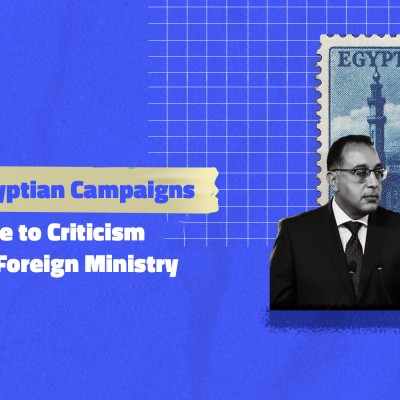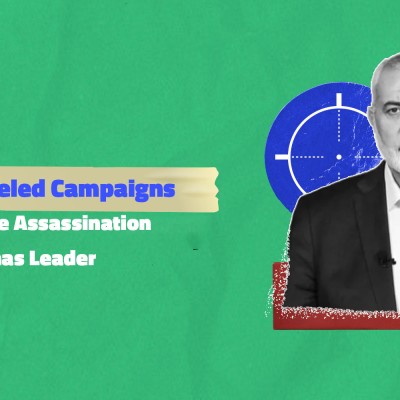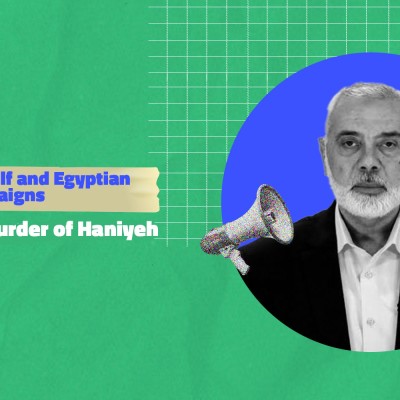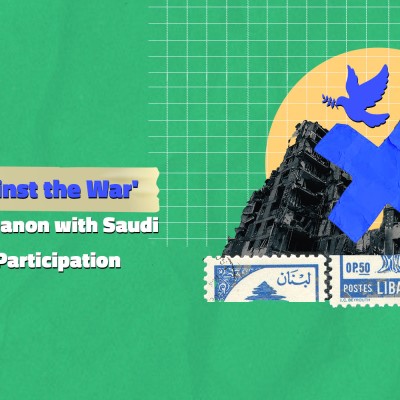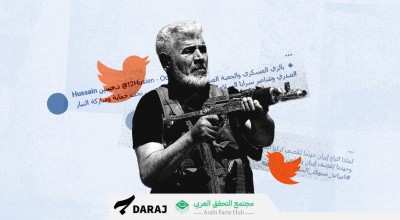Iran’s Digital Armies in Iraq and Lebanon Attack Homosexuals
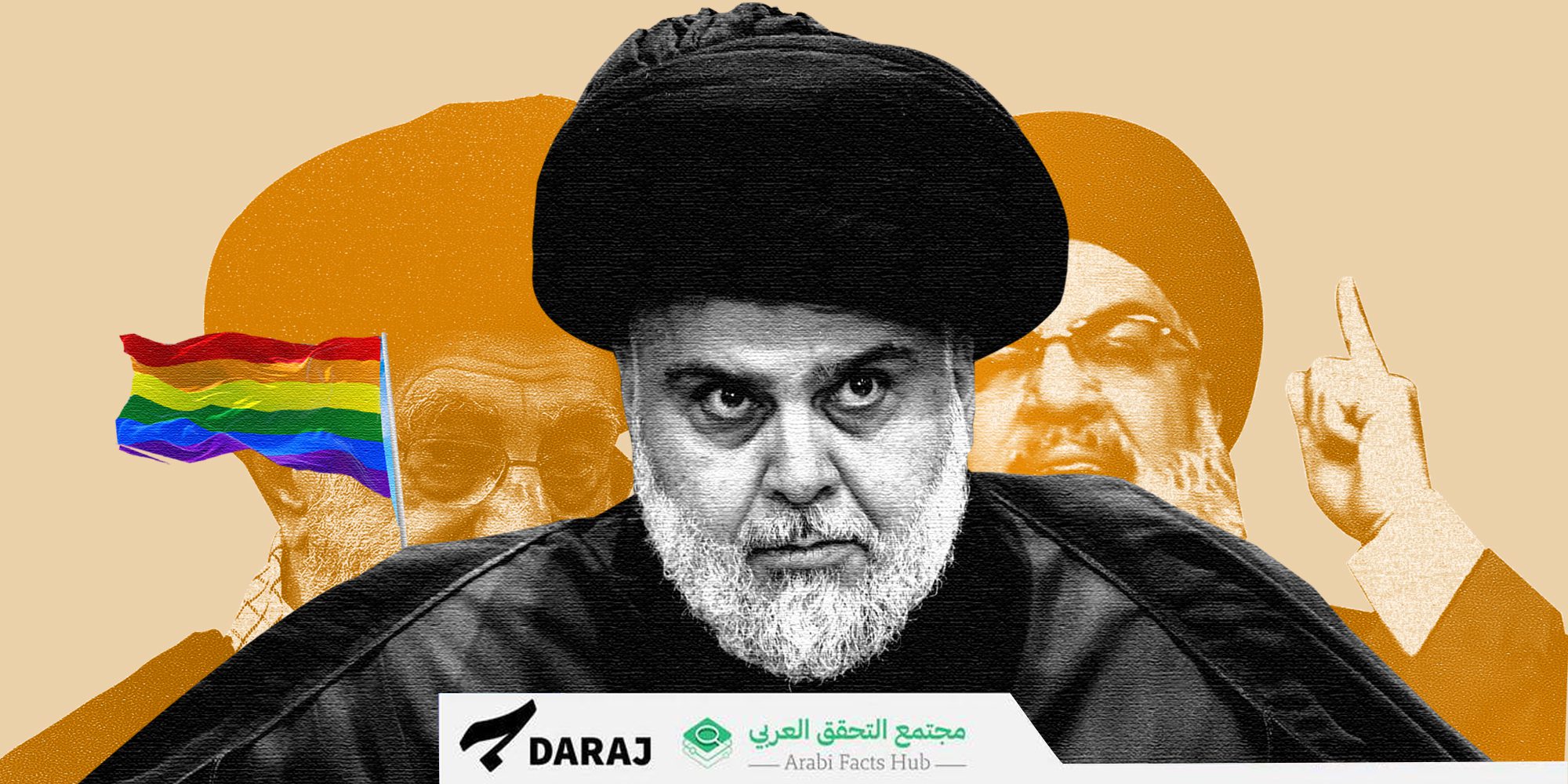
The discussion about homosexuality is ongoing, but the period from June to August 11 was rife with virtual events and interactions on social media, blogs, news websites, and government decisions that further intensified the discourse.
The LGBTQ+ community faced consecutive coordinated digital campaigns from June (the Pride Month) until August, accompanied by statements, governmental decisions, and parliamentary actions in many Arab countries.
Hezbollah Secretary-General, Hassan Nasrallah, was at the forefront of this incitement campaign. This trend was also echoed by the Houthis in Yemen, and Shiite Iraqi factions, the majority of which are linked to Iran.
These campaigns employed various methods to amplify their discourse and increase its spread, including the use of fake accounts, repetitive and identical content, and reliance on some accounts bearing the blue verification mark.
The discussion about homosexuality is ongoing, but the period from June to August 11 was rife with virtual events and interactions on social media, blogs, news websites, and government decisions that further intensified the discourse.
To measure the level of interest on these platforms, we used a variety of potential keywords that are likely to be popular and widely used, especially in the Arab region. These keywords include "homosexuality," "homosexuals," "deviant," "aberrant," and "gay."
The search rates for these keywords during the period in question increased by 73 percent compared to previous periods, indicating their high usage among many social media users, as well as news websites and forums.
Since June, there have been over 248,000 posts, with an average daily publication of about 3.5 posts, according to data from the Meltwater tool.
These statistics and interactions reflect the significant level of interest in this issue. These posts generated over a million interactions across various platforms, with a daily average of more than 14,000 interaction instances.
Illustration of the interest index in the issue of homosexuality on fabricated social media platforms since last June – Meltwater
Twitter garnered the lion share of posts, with 243,000 out of a total of 248,000 posts. The posts originated from 34 countries, and tweets were viewed more than 133 million times on Twitter alone, according to data collected by the Meltwater tool.
In addition to the United States, the leading countries in order were as follows: Saudi Arabia, Egypt, Iraq, Pakistan, Yemen, Kuwait, Iran, the United Arab Emirates, and Algeria. Many other Arab and Islamic countries followed.
Illustration depicting the countries from which tweets about the issue of homosexuality originated - Meltwater.
The analysis of emotions and sentiments expressed in posts about homosexuality across various platforms indicates that 50.7% (equivalent to 125,000 posts) were negative towards the issue. About 40.2% (99.6 thousand posts) appeared to be neutral, while positive impressions accounted for 8% (21.3 thousand posts).
The nature of emotions and sentiments towards homosexuality during the analyzed time period - Meltwater.
Iraq: Political turmoil and consensus on attacking homosexuality:
The political conflicts among Iraqi Shiite factions have been ongoing for years, particularly those close to Iran and the followers of the Shiite leader Muqtada al-Sadr. Nonetheless, the issue of homosexuality became a point of agreement and collaboration among these factions, which control massive digital armies.
As football fans turned their attention to the World Cup in Qatar at the end of last year, European criticism arose regarding the tournament organizers' stance on homosexuality. In response, supporters of the al-Sadr movement launched a coordinated online campaign using the hashtag #Religions_against_LGBTQ. Arabi Facts Hub previously exposed the activity of this campaign, and its reliance on a network of automated and fake accounts.
On June 14, the al-Sadr movement resumed its anti-LGBTQ+ campaigns by launching the hashtag #No_to_spreading_obscenities. This hashtag garnered over 108,000 tweets, the content reached 468,000 accounts, and expanded its potential visibility to nearly two million accounts. The sudden vertical leap in the chart below is an indicator of coordinated electronic campaigns.
Activity of the hashtag #No_to_spreading_obscenities
Statistics on interactions with the hashtag #No_to_spreading_obscenities indicate that 74.3% of the tweets containing the hashtag were retweets, while original individual tweets accounted for only 15.9% of the total tweets. This is another indicator of significant manipulation and intentional amplification of the hashtag.
Out of a total of 173,000 tweets, there were 108,000 tweets from accounts with unknown locations that did not specify their geographic scope, a common characteristic of fake accounts.
Regarding the accounts, it was observed that many accounts that participated in the initial campaign using #Religions_Against_LGBTQ had stopped their activity since then. Some of them resumed participation in the new campaign with the hashtag #No_to_spreading_obscenities. For example, the account @sahbalzman773 broadcasted 14 tweets and used stickers from the first hashtag in the new one. The same applies to the account @az4753829.
It's worth noting that the suspension of account activity is a common practice. Typically, organizers of such campaigns give them a temporary break, perhaps to evade detection by Twitter's technological sensors after their intensive activity during a specific time period, allowing the nature of their activity to remain undisclosed. Later on, these accounts often resume their activity.
The tweet network included a group of fake accounts with foreign names, but they were engaged in the campaign through "retweets."
These accounts were created within a few days during October and November 2022, just before the launch of the first al-Sadr movement campaign against the LGBTQ+ community. But they did not participate in that campaign at the time.
The accounts replace their profile pictures with explicit images, and their content consists of retweets of tweets in various languages such as Arabic, English, Spanish, Persian, and Hebrew. Some of them include explicit content, along with previous tweets supporting the al-Sadr movement.
Examples of these accounts include @Esther_9255, @Helena_Kalie22, @JoeyTatum26, @DorothyHayden23, @EmmaRylie25, @Barbara_6695, @EdithSaylor__24, @Diana_4789, @HeatherPayton28, @Adelaide__8233, @GraceKenley__26, @Beatrice_2833, @HeatherPayton28.
The hashtag included tweets containing misleading information, as in the example below when footage published by the well-known social media news agency Storyful was circulated, and ABC News in the United States obtained it from them.
While the accounts participating in the campaign shared the footage, claiming that a lightning strike caused a fire in an American church "after celebrating the pride month" in Boston, Massachusetts. This is a misleading and false narrative, debunked by Reuters, which clarified that the fire occurred in the same state but in the city of Spencer, and that the church did not host an event for the LGBTQ+ community.
One day before the launch of the al-Sadr movement's campaign, another hashtag appeared, but this time it was backed by the Iraqi close to Iran. The hashtag, #America_nation_of_perversion, garnered 17,260 tweets, with 16,276 tweets being broadcasted on June 13 alone, the peak day.
The total interactions for the tweets reached 20,329, seen by more than 82,000 people, and it became potentially visible to over a million accounts, according to Meltwater.
While Iraq led the countries from which tweets on the hashtag originated, there were 15.8 thousand tweets from accounts that did not disclose their geographic location. After Iraq, Israel came next – due to the presence of Arabic-speaking accounts identifying themselves geographically in Israel – followed by Lebanon and Yemen.
Retweets constituted 82.5% of the total content published under the hashtag, while original tweets made up only 17%.
The interactions with the hashtag reveal the presence of organized groups behind the promotion and amplification of the hashtag. This includes accounts associated with "Electronic Al-Qaher Team," "Al-Nujaba Movement," and "Hashd Trendy Bottles." These entities are linked to the quasi-military Popular Mobilization Forces (PMF) and the Al-Nujaba Movement, both of which are associated with Iran and are subject to U.S. sanctions. Additionally, these accounts promoted statements from Akram al-Kaabi, the Secretary-General of the Al-Nujaba Movement, which opposes the LGBTQ+ community.
The groups used Telegram channels as a gathering and rallying point before spreading their message on Twitter, as seen in the channel "Hashd Trends," which describes itself as a "team aiming to provide media support for the resistance in all its forms: religious, political, military, or economic."
"Hashd Trends" broadcasted 63 posts as part of its efforts to mobilize the tweet campaign. Twitter then became a reflective mirror for these posts with identical copies on the platform. The channel's posts contained pre-prepared scripts ready for dissemination, with accounts posting images of Abu Mahdi al-Muhandis, the deputy head of the Iraqi Popular Mobilization Forces (PMF), Qasem Soleimani, and the Al-Nujaba Movement and the Popular Mobilization Forces.
Hassan Nasrallah’s Incitement:
On July 23rd, Hassan Nasrallah, the Secretary-General of the Lebanese Hezbollah party, stated that they would not allow the LGBTQ+ movement in Lebanon, even if the United States or the European Union supported it. He called for confronting homosexuality, considering it not just a battle for a party or a sect but a battle for the entire society, including Muslims and Christians, and it should be addressed using all means without limits.
Following Nasrallah's speech, discussions about LGBTQ+ issues surged with over 3,000 tweets, 40% of which contained negative comments, according to Meltwater statistics.
At that time, the wave did not take an organized form from Hezbollah supporters, except for the resharing of excerpts from Nasrallah's statements. Nevertheless, there was some repeated content, with attacks directed at Lebanese figures who criticized what the leader of the party said. Among the targeted tweets were those from the websites "Partner but," "Daraj," and the journalist Diana Maqlid.
These repeated posts originated from the "Media Resistance Forum" channel on Telegram. The channel is affiliated with Hezbollah's Digital Operations Room, through which they launch their campaigns. It has more than 5,600 subscribers.
Hezbollah’s supporters later resumed their campaign against the LGBTQ+ community, but in a more organized manner. The used the hashtag #Trend_of_Deviance, which experienced a sudden surge with at least 2,431 tweets by midday on August 13th.
The call to participate in the hashtag campaign also appeared through the "Media Resistance Forum" channel on Telegram, explaining the reason for its launch. The channel stated that it aims to prevent advocates of deviance from dominating the cultural scene with their noise and complaints. So as not to leave the Minister of Culture alone in facing this threat, they urged people to participate in the tweeting campaign.
In its call, the channel referred to a petition signed by Lebanese politicians and intellectuals criticizing the statements of Minister of Culture Mohammad Wissam Al-Murtada about the movie "Barbie," which, he claimed, promotes homosexuality.
The call also attacked some MPs from the Movement for Change and the Brigades, including Mark Daou and Nadim Gemayel, after their criticism of Hezbollah's campaign. The MPs had called on people to sign a petition calling for the repeal of provisions in the penal code criminalizing the LGBTQ+ community and their inability to report assaults. The same attack was repeated against MPs Mark Daou and Nadim Gemayel by the Nasim Media Center affiliated with Hezbollah in the Bekaa region. The posts, transferred from Telegram to Twitter, also gained significant interaction.
Call from Hassan Nasrallah, and ‘Governmental’ Response in Iraq
In his recent statements, Hassan Nasrallah called for refraining from using the terms "homosexuality" and "homosexuals" and replacing them with "deviance" and "deviants" when referring to the LGBTQ+ community.
A few days later, the response came not from Lebanon but from Iraq. The Iraqi Media and Communications Commission ordered media outlets and social media companies operating in the country to use the term "sexual deviance" instead of "homosexuality," according to a document issued by the commission.
Furthermore, the commission prohibited the use of the term "gender" and instructed all mobile phone and internet service companies to refrain from using these terms in their mobile applications.
The Communications Commission stated that its decision aims to "protect society and its authentic values from foreign terms that have acquired meanings contrary to public order and general morality."
Yemen: Houthis on the same wavelength
During the same period, there were several related hashtags with participation from Yemeni accounts. These accounts exhibited activity suggesting affiliation with the Houthi group in Yemen, which is linked to Iran.
There were four Houthi-related Yemeni hashtags: #No_to_homosexuality, #Sexual_Deviance, #America_Symbol_of_Deviance, #America_Homosexual_Nation.
These hashtags gathered more than 22,000 tweets and were seen over three million times. The peak periods for these hashtags occurred frequently since June. Retweets constituted 72.8% of the tweets, while original tweets accounted for approximately 9%.
The majority of tweets originated from Yemen, followed by Saudi Arabia, Iraq, Lebanon, the United States, Kuwait, Bahrain, Egypt, China, and Syria.
The content of the tweets promoted the idea that homosexuality is "not a disease that needs treatment but a scourge that needs to be eradicated," according to a recurring text shared.
Among the influential accounts using these hashtags due to their large number of followers are the accounts of Al Mayadeen channel, which is close to Hezbollah; and the accounts of the Yemeni journalist Ayman Al Mansouri, Saudi businessman Khaled Al Saud, Saudi sports critic Adnan Jastania, and the "Al Khaleej Online" website.
In summary:
- Coordinated digital campaigns opposing the LGBTQ+ community occurred simultaneously or in close proximity to each other.
- The majority of organized campaigns have affiliations with Iran, including Hezbollah, the Houthi group, and Iraqi factions.
- Open incitement against the LGBTQ+ community by Hezbollah's Secretary-General, and official decisions in Iraq to replace the term "homosexuality" with "deviation."
- The campaigns relied on fake accounts and repeated content to amplify the spread of hashtags.
- Similarities in the launch approach of the campaigns, involving Telegram channels for gathering before transitioning to Twitter and other social platforms.
- Telegram channels provided ready-to-use scripts for Twitter posts, adapted to fit the standard tweet size on the platform.
- Attempts to attack and discredit those who reject Hassan Nasrallah's inciteful statements against the LGBTQ+ community.
